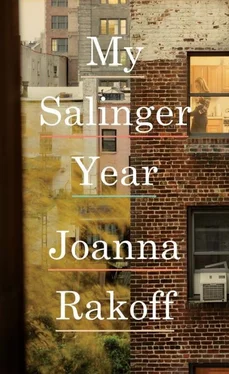“Well, nice to meet you, Suzanne,” he said, finally, in something akin to a normal voice. “I’m calling to speak to your boss.” I had assumed as much. Why had Pam put him through to me, rather than taking a message? My boss was out for the day, it being Friday, her reading day.
I conveyed this to him, or hoped that I did. “I can call her at home and have her call you back today. Or she can give you a call when she gets in on Monday.”
“Monday is fine,” he said, his voice ratcheted down another notch. “Well, very nice to meet you, Suzanne. I hope we meet in person someday.”
“Me, too,” I said. “Have a great day.” This was not a phrase I ever used. Where had it come from?
“YOU, TOO!” Ah, the shouting.
I put the phone down and took a deep breath, as I’d learned to do in ballet. My entire body, I realized, was shaking. I stood up and stretched.
“Jerry?” asked Hugh, stepping out of his office with a mug of coffee.
“Yes!” I said. “Wow.”
“He’s deaf. His wife set up this special phone for him, with an amplified receiver, but he refuses to use it.” He sighed his trademark sigh. To be Hugh was to be let down by the world. “What did he want?”
“Just to talk to my boss.” I shrugged. “I offered to call her at home and have her call him back, but he said Monday was fine.”
Hugh wrinkled his face in thought. “Hmm, why don’t you call her anyway. I think she’d want to know.”
“Okay,” I said, thumbing through my Rolodex.
She wasn’t home and had no answering machine. She didn’t believe in them. Just as she didn’t believe in computers or voice mail, another newfangled invention not employed by the Agency. If you called during business hours, you reached Pam, the receptionist. If you called outside business hours, the phone just rang and rang, as it did at my boss’s apartment, twenty blocks north of the office. I tried again, every hour or so, until the end of the day, to no avail. It would have to be Monday.
I’d been at the Agency for a few months now, and my boss had not yet asked me to read anything. Minus this task, my job did indeed seem to resemble that of a secretary, as my father had said, mildly bolstered by the proximity to great works of literature. Without really intending to, I found myself lying when questioned about my responsibilities. “So much reading,” I would say at parties. “I’m always carrying a manuscript around with me. I can’t keep up.”
There was another assistant at the Agency, Olivia, who was indeed overburdened with reading, and it was her complaints that I mimicked. A beauty in the Pre-Raphaelite vein—ethereally pale, ashy ringlets, tubercular figure—Olivia was a truly terrible assistant, forever losing contracts and packages, misfiling correspondence, and simply not answering her phone. She had a handsome Italian boyfriend with whom she fought constantly—it was not uncommon to walk by her desk as she screamed at him and slammed down the phone—and who sometimes arrived at the office to pick her up, embracing her in a mildly inappropriate way. Hugh couldn’t utter her name without rolling his eyes. I desperately wanted to know her, or at least wanted to absorb some modicum of her slender, languorous charms.
The following Monday, the burble of the coffeemaker informed me of her arrival. I had been saving a question for Hugh—regarding those complicated pink cards—and decided to use this as an excuse to say hello. “Oh, I always do that wrong,” she answered nonchalantly, cupping her mug of black coffee in two hands and seating herself on her desk, a gesture that shocked me, for I knew that my boss would be horrified by such overfamiliarity with the office furniture. Today, she had on a black chiffon blouse covered in large white dots and a slim-cut black skirt, which hung loosely on her narrow hips, bunching up above her knees when she sat; on her feet, red ballet slippers that barely rustled when she traipsed across the carpet. “Maybe you just shouldn’t bother. Will anyone know?” She yawned extravagantly. “Do you want coffee? I need more.” As I followed her to the coffeemaker, she explained that she was a painter, and—like me—she’d ended up at the Agency through happenstance. “Basically, I have no interest,” she said with a shrug. “I have to get out of here.”
“But the reading must be great?” I asked, trailing her back to her desk, which she again leaped atop. “Some of it? My boss doesn’t ask me to read anything.”
“Not really,” she said, rolling her large blue eyes. “Most of it’s terrible. You read a few pages, you can tell.”
Just then, as I’d feared, my boss came by, cigarette in hand. Every so often, she surprised me—surprised everyone—by coming in the back entrance, which led directly into our little suite. “Olivia, what on earth are you doing? Get down from there immediately.” She raised her eyebrows at me, as if to say, I told you not to fraternize with that good-for-nothing .
Olivia worked for two different agents, Max and Lucy, who were often referred to as a unified entity—“MaxandLucy”—for they were the closest of friends and spent their days racing in and out of each others’ offices, laughing throatily at each other’s jokes, and lighting each other’s cigarettes. Lucy oversaw film rights for all Agency clients and represented a host of children’s book authors, as well as a few well-reviewed novelists. She’d started her career at the Agency, as an assistant, and though she was perhaps forty, at most, she embodied the best of the Agency’s archaic charms: she smoked cigarettes through an ivory holder, her hand held dramatically in the air, dressed solely in elegantly draped black crepe shifts, and effortlessly emitted Parker-ish quips in her low Bacall-ish voice. Max had been brought in a few years earlier to—it was no secret—rejuvenate the Agency. He was a star, one of the best-known agents of the moment, and represented a host of writers I loved—Mary Gaitskill, Kelly Dwyer, Melanie Thernstrom—and just as many that I’d long wanted to read, like Jim Carroll and Richard Bausch. His writers published in magazines I read— Granta, Harper’s, The Atlantic —and seemed always to be reading at KGB or Limbo, and his life was an endless succession of book parties. Every week, his circulating folder arrived thick with deal memos, and when he came to our side of the office to talk to my boss, it was usually to get her take on an enviable problem: three different editors were fighting over the same book and the author was losing her mind trying to decide which house to choose.
They were impossibly glamorous, Max and Lucy, and I loved merely to be in their proximity, listening to them banter, cigarettes held aloft. Max was short, with a ring of curly hair surrounding a bald pate, and Lucy squat, her skin dulled by nicotine, but their intelligence and wit—and the passion with which they threw themselves into their work, their books, their authors—made them as attractive, as thrilling, as film stars. Also, they were kind: they treated both Olivia and me less like furniture than did the older agents—Lucy asking me about my dresses, Max about my books. And an idea struck me as I sat chatting with Olivia: I could read for them. My boss had no reading for me. They had an assistant with no interest in reading. I trotted directly to Hugh’s office. “That makes sense,” he said. “So long as it doesn’t interfere with your work for your boss.”
“It won’t,” I promised. “I’d do it at home. At night.”
“Okay,” he said. “Go talk to Max. I’m sure he’ll be thrilled. I’ll clear it with your boss.”
“Great!” I said. “Thank you. So much.”
Before I could walk over to Max’s office, my boss appeared in the doorway, glowering. “Did Jerry call on Friday?” I nodded. Hugh, too, looked frozen. “Why didn’t you tell me?”
Читать дальше












